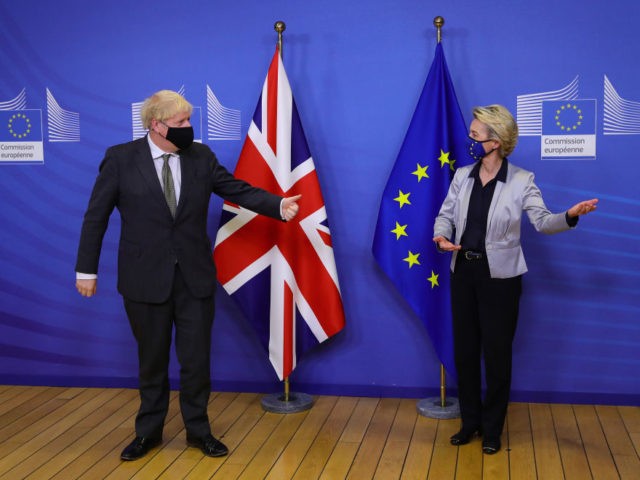Boris Johnson has conceded to the European Union and dropped his post-Brexit regulation cutting plan in favour of a ‘Net Zero’ agenda.
The British government announced on the 1st of February 2022, a day after the two year anniversary of Britain leaving the European Union, that their “one-in-two-out rule” – meaning for every new British regulation two EU rules would be removed – was no longer viable if Britain is to be “achieving net zero” carbon emissions in line with the government’s plans by 2050.
The government has seemingly U-turned on Prime Minister Boris Johnson’s major Brexit promise — cutting European Union regulations — just 24 hours after announcing that Johnson’s government planned to cut a billion pounds worth of leftover EU regulations, The Telegraph reports.
The move to leave EU regulations in place essentially scraps the Brexit strategy put in place by Lord David Frost the former Chief Negotiator of Task Force Europe, who planned to untangle Britain from unnecessary Brussels’ bureaucracy, saving British businesses from unnecessary expense and effort. Frost resigned in December 2021 in opposition to Johnson’s ramped up coronavirus restrictions.
He has since criticised the government for not being conservative in any meaningful way.
Britons Want Referendum on Boris’s Net Zero Green Agenda: Poll https://t.co/w5Moux7S1q
— Breitbart London (@BreitbartLondon) October 28, 2021
It has been suspected that Johnson’s wife Carrie Johnson née Symonds, an “unelected eco-activist and animal rights campaigner”, is behind much of the government’s new green agenda – an accusation Number 10 has repeatedly denied.
Chairman of the Bow Group, Britain’s oldest Conservative Think Tank, Ben Harris-Quinney, condemned the Conservative’s new green agenda and said that Johnson’s dwindling popularity is because “he isn’t delivering on the patriotic conservative vision for the country people had when they voted Brexit” in remarks to Breitbart London.
Harris-Quinney went as far as to say Johnson is “governing to the left of Tony Blair on every major area of policy: a million people a year pouring into the country each year, highest taxes since WW2, Net Zero, and radical LGBT lobby groups like Stonewall funded and championed in Downing Street and at the Conservative Party conference”.
The Bow Group’s Chairman blamed Johnson’s wife Carrie Johnson for Boris’ drop in “popularity” and suggested that if he does not “remove Carrie from” the political decision-making process then “his premiership will fail for the same reasons Cameron’s and May’s did – Conservative voters expect conservative results-or else”.
Harris-Quinney did however suggest that Johnson could “survive” if he “sees the light” and “announces a new raft of conservative policies”.
Boris Johnson’s former Chief Advisor Dominic Cummings took a blunter approach in his description of the British Prime Minister and described him as a “babbling f***wit” who doesn’t “have the balls” to say to his “very forceful” wife, “Listen, I’m prime minister and this is what I’m doing”, during an interview with New York magazine on the 30th of January 2022.
Delingpole: Princess Nut Nut Elbows Bojo Towards the Great Reset https://t.co/bXxUwad3OY
— Breitbart London (@BreitbartLondon) November 17, 2020
Johnson’s Net Zero plan has been met with a frosty reception across the nation in general with sixty per cent of Brits saying they rejected the idea of paying more taxes to fund the Build Back Better green agenda.
The Conservative’s new ‘green’ agenda will also disproportionately financially impact ‘Red Wall’ voters, a large demographic that enabled Johnson to win his 2019 election victory – some voting Conservative for the first time ever.
Red Wall voters are likely to be one of the hardest hit by Johnson’s Net Zero agenda with new ‘green’ taxes and subsequent rising energy prices, combined with an increased cost of living likely to put a strain on bank accounts across Britain, which will undoubtedly have an impact on the Conservatives’ support from these voters.
The ‘Red Wall’ refers to industrial areas of Britain, that were once home to coal mines, steel plants, and manufacturing, largely in the North of England, were where the working-class voters typically supported Labour — whose traditional colour is red.
The term has some parallels with the so-called ‘Rust Belt’ in the United States.

COMMENTS
Please let us know if you're having issues with commenting.